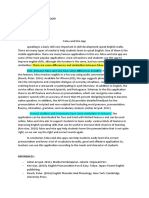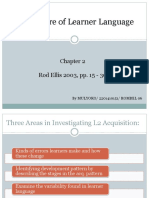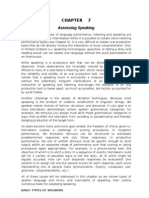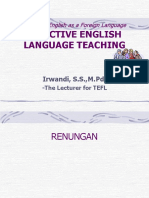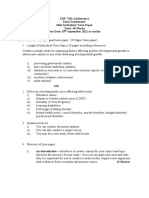How Should We Expose Students To Language
How Should We Expose Students To Language
Uploaded by
icaCopyright:
Available Formats
How Should We Expose Students To Language
How Should We Expose Students To Language
Uploaded by
icaOriginal Title
Copyright
Available Formats
Share this document
Did you find this document useful?
Is this content inappropriate?
Copyright:
Available Formats
How Should We Expose Students To Language
How Should We Expose Students To Language
Uploaded by
icaCopyright:
Available Formats
How should we expose students to language.
In a classroom, a major part of the teachers job is to expose students to
language so that they can use it later. Here are some examples of how we can do
this.
Example 1 : its a pen ( complete beginners)
Teh teacher is with a group of complete beginners. She wants them to be abla to
say what objects are called. She holds up a pen, points to it and says
pen....look....pen... penas many times as she thinks it necessary. The students
have han a chance to hear the word.
Later, seh may want to go beyond single words, she can hold up the pen and say
listen...its a pen.... its a pen.... its a pen. Once again, she is giving students a
chance to hear the sound of the new language before they try to use it
themselves. Later still, she may start asking the question what is it ? (pointing to
the pen)... what is it ? so that student get a chance to hear what the question
sound like.
Because many people acquire language by hearing them first, many
teachers prefer to expose students to the spoken form first ( as in this example ).
However, some student may need the reassurance of the written word as well
Example 2 : invitations (elementary)
The teacher wants her elementary students to be able to invite each other and
respond ti invitatios. She plays a tape on which the following dialogue is heard.
Sarah : joe ! helllo
Joe
: oh hello, sarah
Sarah : Umm, How are you :
Joe
: Fine, why ?
Sarah : er, no reason.... (pause....nervously ) are you doing anything this evening
?
Joe
: No. Why ?
Sarah : would you like come to the cinema ?
Joe
: yes, that would be great. Well, it depends. Whats on ?
Sarah : the new tarantino film.
Joe
: i suppose, its all violent.
Sarah : yeah, probably. But its meant to be really good
Joe
: i dont usually like violent films.
Sarah : Oh, OK. Well, we could go to pizza place or something
Joe
: im only joking ,id love to come.
The teacher plays the tape more than once so that students get a good chance
to hear the invitation language- some of which ( the present continuous,
vocabulary items ) they probably already know. She may also say the invitation
part of the dialogue herself and she may feel it is a good idea to show the
students a written version.
Why students make mistake ?
All students make mistakes at various stages of their language learning. It is part
of the natural process they are going through and accurs for a number of
reasons. In the firts place, the students own language may get in the way. This is
most obviously the case with false friends- those word which sound or look the
same buat mean something different such asassistir in Spanish which means
attendin Engling and not assist. False friends are more common where the
learners language share a commmon heritage with english.(i.e. Romance
language).
Grammatical considerations matter too: japanese students frequenlty have
trouble with article usage, Germans have to get used to positioning the verb
correctly, Arabic students have to deal with a completely different written system
etc.
Interference form students own language in not the only reason for making
mistakes. There is a cattegory which a number of people call developmental
errors. These are the result of conscious or subconscious processing which
frequently overgeneralises a rule, as, the starts sayingi must to go , not
realising that the use of to is not permitted with must.
Some mistakes are deep seated and need constant attention ( ask experienced
teachers about the third person singular of the present simple). While these are
examples of error, others seem to be more like slip made while students are
simultaneously processing information and there are therefore easier to correct
quickly.
Whatever the reason for getting it wrong, it is vital for the teacher to realise that
all students make mistakes as a natural and useful way of learning. By working
out when and why things have gone wrong, they learn more about the language
they are studying.
You might also like
- Dpr1505 Assignment 02Document10 pagesDpr1505 Assignment 02ntombi100% (1)
- Paused Rep Mastery: About The ProgramDocument3 pagesPaused Rep Mastery: About The ProgramDVM 700No ratings yet
- The Use of YouTube in English Language TeachingDocument7 pagesThe Use of YouTube in English Language TeachingNurul Hasanah BeautyShawol100% (1)
- Current Issues For EilDocument2 pagesCurrent Issues For EilfujionoNo ratings yet
- Frontcoverfg LiekDocument6 pagesFrontcoverfg Liekapi-211838406No ratings yet
- Contoh Dialog Asking and Giving OpinionDocument4 pagesContoh Dialog Asking and Giving Opinionica100% (1)
- Syllabus Simple Past Tense CMD AssignmentDocument5 pagesSyllabus Simple Past Tense CMD AssignmentFauzanHutomoNo ratings yet
- of ESP For Secretary Students On SMK 7 BatamDocument13 pagesof ESP For Secretary Students On SMK 7 BatamWulandari KristantiNo ratings yet
- Lesson Plan - NEW INTERCHANGE BOOK 2 LESSON 5Document6 pagesLesson Plan - NEW INTERCHANGE BOOK 2 LESSON 5Viviane Pires100% (1)
- Discourse Analysis MakalahDocument7 pagesDiscourse Analysis Makalahamhar-edsa-39280% (1)
- Technologies For Teaching and Learning L2 ListeningDocument44 pagesTechnologies For Teaching and Learning L2 ListeningAlp ÇelikNo ratings yet
- Self Introduction & Introducing Other PeopleDocument12 pagesSelf Introduction & Introducing Other PeopleJanssen Samuel HalimNo ratings yet
- 12 Principles BrownDocument3 pages12 Principles BrownmuymursinahNo ratings yet
- RPKPS Translation English-Indonesia (2021)Document26 pagesRPKPS Translation English-Indonesia (2021)Nerds Vags IrfanNo ratings yet
- Soal Uts English Phonology 2022 - Reguler PagiDocument2 pagesSoal Uts English Phonology 2022 - Reguler Pagiestu kaniraNo ratings yet
- Writing Tugas Ke 3Document1 pageWriting Tugas Ke 3silvana fq100% (1)
- Week 1: Some Issues in Translation Practice & Interpreting PracticeDocument31 pagesWeek 1: Some Issues in Translation Practice & Interpreting PracticeVân AnhNo ratings yet
- Mini Research On Phonetic PhonologyDocument12 pagesMini Research On Phonetic PhonologyAlifiyahNo ratings yet
- Canoy - Goals, Content and SequencingDocument6 pagesCanoy - Goals, Content and SequencingFe CanoyNo ratings yet
- Thesis s2 Pendidikan Bahasa InggrisDocument7 pagesThesis s2 Pendidikan Bahasa Inggristarahardinhuntsville100% (1)
- English Phonology 2 Final Exam (Valdo Varelleo Zulla 1619500066)Document4 pagesEnglish Phonology 2 Final Exam (Valdo Varelleo Zulla 1619500066)Takasu ryuujiNo ratings yet
- Rencana Pembelajaran Semester (RPS) : Mata Kuliah: English Morphology Kode: MKK31 Dosen Pengampu: Adip Arifin, M.PDDocument18 pagesRencana Pembelajaran Semester (RPS) : Mata Kuliah: English Morphology Kode: MKK31 Dosen Pengampu: Adip Arifin, M.PDIndra PutraNo ratings yet
- Chapter 2 The Nature of Learner LanguageDocument17 pagesChapter 2 The Nature of Learner LanguageRandi100% (1)
- Text, Genre, and Discourse Shifts NEWDocument55 pagesText, Genre, and Discourse Shifts NEWOuafaeNo ratings yet
- Sentences With Multiple Clauses: Skill 6: Use Coordinate Connectors CorrectlyDocument2 pagesSentences With Multiple Clauses: Skill 6: Use Coordinate Connectors CorrectlyWeni RahmaNo ratings yet
- The Collection of Language Assessment IndicatorsDocument16 pagesThe Collection of Language Assessment IndicatorsEgie SuhendarNo ratings yet
- Intensive Reading Final ExamDocument8 pagesIntensive Reading Final ExamUlinuha DahlinaNo ratings yet
- UTS & UAS Language Assessment 2021 Muh SyafeiDocument2 pagesUTS & UAS Language Assessment 2021 Muh SyafeiFalikh Fadila100% (1)
- IMPERATIVE SENTENCE Bahasa InggrisDocument11 pagesIMPERATIVE SENTENCE Bahasa Inggrisnaila putrizahraNo ratings yet
- Definition of VocabularyDocument3 pagesDefinition of Vocabularyrini oktiyaniNo ratings yet
- Learning Outcomes:: Edition) - New York: Mcgraw-Hill. Practices. New York: Pearson Education IncDocument13 pagesLearning Outcomes:: Edition) - New York: Mcgraw-Hill. Practices. New York: Pearson Education IncMuhammad Sulton RizalNo ratings yet
- Improving The StudentsDocument13 pagesImproving The StudentsameliaNo ratings yet
- ESP The Development of ESP and ESP Approach Not A ProductDocument6 pagesESP The Development of ESP and ESP Approach Not A Productmilla jamilahNo ratings yet
- Speaking TestDocument12 pagesSpeaking TestSneha Nair100% (1)
- Assessing Speaking: Basic Types of SpeakingDocument35 pagesAssessing Speaking: Basic Types of SpeakingDodi MulyadiNo ratings yet
- RPS Eng For Hotel N Tourism 2Document7 pagesRPS Eng For Hotel N Tourism 2Paradise PNo ratings yet
- Modul ESP For BusinessDocument34 pagesModul ESP For BusinessAgoes gustyNo ratings yet
- Need Analysis For WaiterDocument2 pagesNeed Analysis For WaiterJonathan AlexanderNo ratings yet
- A Blended Learning Environment For Individualized English Listening and Speaking Integrating Critical Thinking 2013 Compu 1Document21 pagesA Blended Learning Environment For Individualized English Listening and Speaking Integrating Critical Thinking 2013 Compu 1Ketrin ViollitaNo ratings yet
- Grammar Translation MethodDocument7 pagesGrammar Translation MethodReniey Renieytha RhereyNo ratings yet
- Definition of TranslationDocument2 pagesDefinition of TranslationAlexis Martinez Constantino100% (1)
- Silabus - ESPDocument6 pagesSilabus - ESPAdimarta TeguhNo ratings yet
- Grammar Lesson PlanDocument8 pagesGrammar Lesson PlanMunnise ÖztürkNo ratings yet
- Popular Methodology (TEFL Methodology)Document18 pagesPopular Methodology (TEFL Methodology)FedrataNo ratings yet
- Challenges of Teaching English - 2 PDFDocument17 pagesChallenges of Teaching English - 2 PDFMahmood Khan100% (1)
- Car-Chapter 1 EllynaDocument22 pagesCar-Chapter 1 Ellynaellyna_elvindoNo ratings yet
- Language Testing Assessing Listening: By: Nina Zulfa Duwi Meilisah Singgih AgustiawanDocument15 pagesLanguage Testing Assessing Listening: By: Nina Zulfa Duwi Meilisah Singgih AgustiawanSinggih Agus'tiawanNo ratings yet
- SYLLABUS English 5 TOEFL PreparationDocument5 pagesSYLLABUS English 5 TOEFL PreparationAde Saputra100% (2)
- The Grammar-Translation MethodDocument16 pagesThe Grammar-Translation MethodĐăng Nguyễn100% (1)
- Teaching ReadingDocument12 pagesTeaching ReadingDado Dodo100% (1)
- Deixis: in SemanticsDocument24 pagesDeixis: in SemanticswidyaNo ratings yet
- Advanced Listening-RPS-ELT - 2021Document12 pagesAdvanced Listening-RPS-ELT - 2021Muhammad PanjiNo ratings yet
- Sue Davidoff and Owen Van Den BergDocument4 pagesSue Davidoff and Owen Van Den BergOscar50% (2)
- Chain DrillingDocument38 pagesChain DrillingSririzkii WahyuniNo ratings yet
- Effective Class Management Rezumat Mary UnderwoodDocument31 pagesEffective Class Management Rezumat Mary UnderwoodFahad Khan TareenNo ratings yet
- English Grammar A1 Level Adverbs of Frequency - English Grammar A1 Level PrintDocument2 pagesEnglish Grammar A1 Level Adverbs of Frequency - English Grammar A1 Level PrintBooks for languagesNo ratings yet
- Slide Tefl 1Document104 pagesSlide Tefl 1Sephia PutryNo ratings yet
- Assessing Listening Through Multiple Choice TestsDocument5 pagesAssessing Listening Through Multiple Choice TestsSriary PrawiniNo ratings yet
- 204-262-1-SM - The Analysis of English Teachers' Lesson Plans Through Objectives TheoryDocument5 pages204-262-1-SM - The Analysis of English Teachers' Lesson Plans Through Objectives TheoryLily MaulidyahNo ratings yet
- LKPD Pertemuan 1-DikonversiDocument8 pagesLKPD Pertemuan 1-Dikonversimhailk situruNo ratings yet
- Evaluation of Translation Kel 3Document7 pagesEvaluation of Translation Kel 3Khairani Hapshah PanggabeanNo ratings yet
- Mid Term Test Elt CurriculumDocument5 pagesMid Term Test Elt CurriculumMelaniAjaNo ratings yet
- Studying English (University Students)Document4 pagesStudying English (University Students)belbachirNo ratings yet
- Materi B.inggris SD KLS 3 Semester 1Document5 pagesMateri B.inggris SD KLS 3 Semester 1icaNo ratings yet
- Fruit and Vegetables Buah-Buahan Dan Sayur-Sayuran Buah FruitsDocument4 pagesFruit and Vegetables Buah-Buahan Dan Sayur-Sayuran Buah FruitsicaNo ratings yet
- Body Parts Crossword Games - 12656Document3 pagesBody Parts Crossword Games - 12656ica0% (1)
- DOWN To EARTHDocument2 pagesDOWN To EARTHicaNo ratings yet
- Materi Bahasa Inggris Kelas 3 SDDocument13 pagesMateri Bahasa Inggris Kelas 3 SDicaNo ratings yet
- The Old Doc Is His MotherDocument2 pagesThe Old Doc Is His MothericaNo ratings yet
- Materi Kelas 6Document1 pageMateri Kelas 6icaNo ratings yet
- Context Clues PDFDocument48 pagesContext Clues PDFicaNo ratings yet
- Silabus SociolinguisticsDocument3 pagesSilabus Sociolinguisticsica100% (1)
- Makalah ESPDocument10 pagesMakalah ESPica100% (1)
- Approaches To Program EvaluationDocument6 pagesApproaches To Program EvaluationicaNo ratings yet
- Contoh Judul Skripsi Pendidikan Bahasa Pendidikan Bahasa Inggris KualitatifDocument2 pagesContoh Judul Skripsi Pendidikan Bahasa Pendidikan Bahasa Inggris KualitatificaNo ratings yet
- BIBIOGRAPYDocument2 pagesBIBIOGRAPYicaNo ratings yet
- BIBIOGRAPYDocument2 pagesBIBIOGRAPYicaNo ratings yet
- Kalimat Simple Present Tense Positif Negatif InterogatifDocument2 pagesKalimat Simple Present Tense Positif Negatif InterogatificaNo ratings yet
- Bahan Ajar Descriptive TextDocument3 pagesBahan Ajar Descriptive Textica0% (1)
- Cross Culture UnderstandingDocument10 pagesCross Culture UnderstandingicaNo ratings yet
- Thanking Expression: You Thank Others For What They Give To You and You May Also Have To RespondDocument2 pagesThanking Expression: You Thank Others For What They Give To You and You May Also Have To RespondicaNo ratings yet
- Ancient HistoryDocument60 pagesAncient Historyn.ploegmanNo ratings yet
- Alfozan Award Accessories Competition EnglishDocument5 pagesAlfozan Award Accessories Competition EnglishDasur 128No ratings yet
- Tax Invoice/Bill of Supply/Cash Memo: (Original For Recipient)Document1 pageTax Invoice/Bill of Supply/Cash Memo: (Original For Recipient)nudeNo ratings yet
- Uber AssignmentDocument37 pagesUber AssignmentSheraz KhanNo ratings yet
- Stephanie Case StudyDocument2 pagesStephanie Case StudyBasco Martin JrNo ratings yet
- Chapter One Introduction To Operations ManagementDocument10 pagesChapter One Introduction To Operations ManagementWiz SantaNo ratings yet
- Sprinter 7G Tronic TransmissionDocument7 pagesSprinter 7G Tronic TransmissionRicardo Santo AntonioNo ratings yet
- Positive ReinforcementDocument7 pagesPositive ReinforcementfahimafridiNo ratings yet
- Column GwaliorDocument1 pageColumn Gwaliorvs consultantNo ratings yet
- The Speed of GravityDocument8 pagesThe Speed of GravitymasharecoNo ratings yet
- Chapter 13 IntaccDocument2 pagesChapter 13 IntaccJhuliane RalphNo ratings yet
- Histogram: How To Read The HistogramDocument3 pagesHistogram: How To Read The Histogrammicrobotica126100% (2)
- John Mulholland - Magic of The WorldDocument200 pagesJohn Mulholland - Magic of The Worldstore magic100% (1)
- TicketDocument2 pagesTicketPramod SinghNo ratings yet
- Final Individual Term Paper - 40 Marks - NewDocument3 pagesFinal Individual Term Paper - 40 Marks - Newfazlina harunNo ratings yet
- MacFadden's Physical Training - Bernarr Macfadden 1900Document134 pagesMacFadden's Physical Training - Bernarr Macfadden 1900TalismaniX100% (9)
- ProfileDocument2 pagesProfileDixit PhuyalNo ratings yet
- Grammar Friends 3Document126 pagesGrammar Friends 3luu dinhNo ratings yet
- 2024 January StatementDocument1 page2024 January Statementcontact.sindicateNo ratings yet
- Policy Formulation and EvaluationDocument12 pagesPolicy Formulation and EvaluationJanice Inquiangco CalucagNo ratings yet
- "Research Is A Process of Steps Used To Collect Information To Increase Our Understanding of A Topic or An Issue." - John W. CreswellDocument2 pages"Research Is A Process of Steps Used To Collect Information To Increase Our Understanding of A Topic or An Issue." - John W. CreswellFrancees TambasenNo ratings yet
- Ca 3 Lesson 2 Golden Era of PenologyDocument6 pagesCa 3 Lesson 2 Golden Era of PenologyChristian IlaganNo ratings yet
- Cot - DLP - English 2 by Teacher Jelyn M. HabanaDocument2 pagesCot - DLP - English 2 by Teacher Jelyn M. HabanaBenedict AquinoNo ratings yet
- Elliott Wave - Short Term UpdateDocument12 pagesElliott Wave - Short Term UpdateNazerrul Hazwan KamarudinNo ratings yet
- Polytechnic University of The Philippines Sta. Mesa, Manila: 6.3. Planarity and Euler's Formula 6.4 Graph ColoringDocument10 pagesPolytechnic University of The Philippines Sta. Mesa, Manila: 6.3. Planarity and Euler's Formula 6.4 Graph ColoringJaymie DioNo ratings yet
- Pekka Ervast-The Esoteric School of JesusDocument168 pagesPekka Ervast-The Esoteric School of JesusIG100% (2)
- Bibliografie (Sinteza) DionisieDocument6 pagesBibliografie (Sinteza) DionisieprofsimaNo ratings yet
- United States v. John Matera, Thomas Carbonaro, and Peter Gotti, 489 F.3d 115, 2d Cir. (2007)Document11 pagesUnited States v. John Matera, Thomas Carbonaro, and Peter Gotti, 489 F.3d 115, 2d Cir. (2007)Scribd Government Docs100% (1)















